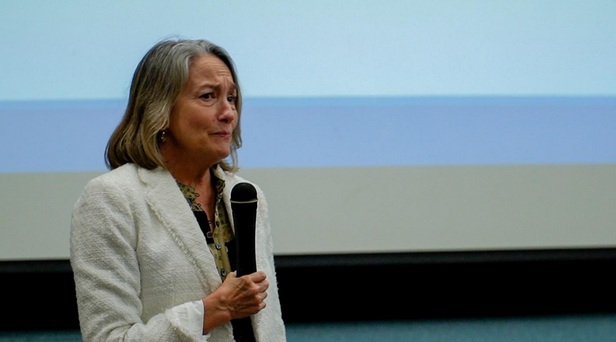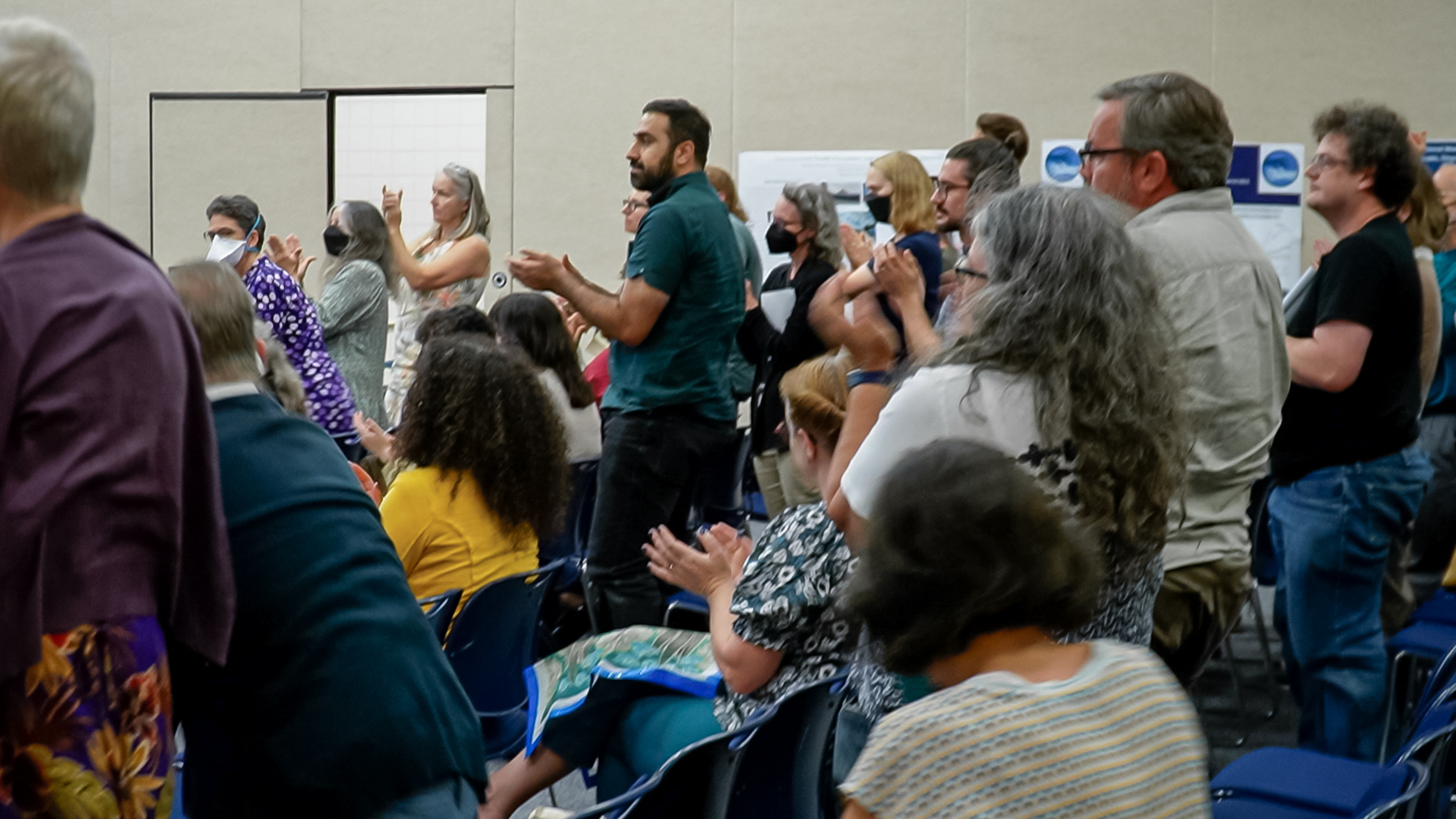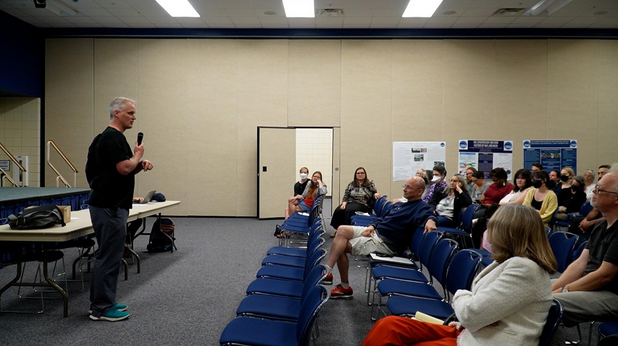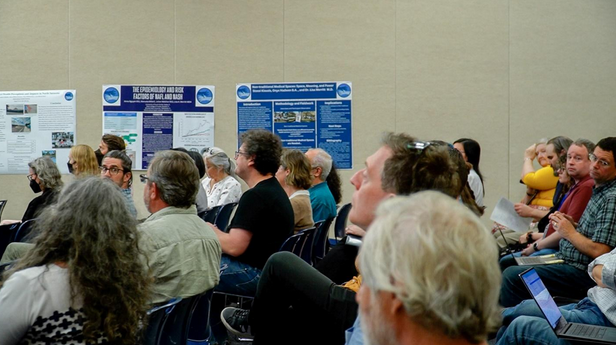On Feb. 8, the New College of Florida’s faculty held their first public meeting since the announcement of new appointments to the Board of Trustees (BOT). It was also the first in-person faculty meeting since the coronavirus pandemic began. Professors and staff from across the college filled dozens of rows of chairs inside the Sudakoff Conference Center, with the meeting’s agenda and the resulting discussion densely filled with gripping moments and public statements from the faculty. One core theme emerged from the meeting—how can we come together to defend New College’s fundamental values?
Key moments included: a statement from current Provost Suzanne Sherman; the reading of a proposed statement from the faculty publicizing open support for the “long-standing values and mission of New College”; the first public address from current Interim President Brad Theissen, who partially aligned himself with the incoming board; and public comments about a range of faculty concerns.
Sherman’s statement was the first item on the agenda and seemed to set the tone for the two-and-a-half-hour meeting that would follow. She echoed points made in her latest report supporting faculty, students and administrators, and gave advice to faculty concerned with students transferring out.
“I know you’re hearing from some students about some interest in transferring,” Sherman said. “One suggestion [to give to students] is that instead of making such a life-changing decision at this moment, it might make more sense to do an exchange at another institution. And we have lots of opportunities for students to do that.”
Sherman then opened the floor for any questions or comments. Assistant Professor of Psychology Kathleen Casto took the opportunity to speak, and thanked Sherman for the work she’s done during this challenging time. “I just wanted to say, I really support you and I’m so thankful to have you as our Provost,” Casto said. “I’ve seen how you’ve been treated in the media, and I’m deeply, deeply sorry.”
The auditorium then erupted into applause for Sherman as the faculty rose up to their feet in respect. It was an emotional moment.


Following Sherman’s statement was thirty-five minutes dedicated to a motion proposing changes to class schedules to allow more time for students to eat lunch between classes. While many were in support, several faculty members expressed concern over whether the changes would encroach on time slots formerly dedicated to childcare—the afternoon is a crucial time for picking up children from school. After discussion held during and outside the meeting, the motion was sent to an electronic vote later that week where it passed with majority support.
Moving to the next agenda item, Professor of Mathematics Patrick McDonald then shared a written statement drafted by several prominent members of the faculty which, if given a majority vote of approval, would be the first explicit document from the faculty declaring a formal position during the conservative takeover of the school. McDonald read the document aloud after explaining how it came to be.
“It’s been a tough week,” McDonald said. “There’s been a lot of discussion. There are groups that are drafting statement positions. And what I’m about to read is the product of one of those groups.”
The statement read in part: “We join with our colleagues from faculties across the [State University System] in supporting widespread initiatives to expand accessibility and inclusiveness for all persons, regardless of race, color, religion, gender, sexual orientation, national origin, age, disability, marital status, veteran status, or political opinion or affiliation.”
And further: “We reject all attempts to politicize our support of every member of our community, which is dedicated to placing academic excellence and career success within reach of high-achieving students from all backgrounds.”
After McDonald finished reading the statement, it received long applause from the faculty gathered.
“We want a statement that reflects something we can all stand behind,” McDonald concluded, before yielding the floor.
Faculty were given two and a half days for review and consideration of the statement before electronic voting closed at midnight on Feb 10. The statement was approved with a majority vote and it is now publicly available.
For the rest of the meeting, current Interim President Brad Theissen—who holds the position temporarily until the employment agreement of the next Interim President, Richard Corcoran, can be approved on Feb. 22—responded to the proposed faculty statement and laid out his own position. He indicated that the best strategy going forward is to work with the incoming board to achieve material gains.

“What I like most about the statement, there’s a lot to New College that we all like, right?” Theissen said. “But, if we’re being honest with ourselves, there’s a lot we want to change about New College as well. Processes don’t work. Technology, outdated facilities and infrastructure. We can leverage some of these changes to fix some of those problems.”
“I have spoken with some of the new trustees on the board,” Theissen continued. “I have spoken with the next Interim President as well. We’re in for some changes right now. Some good, some bad. What I had a sense of is they all truly want excellence for New College. They want an expansion.”
Theissen said that with his limited term as Interim President he would be willing to work with faculty to achieve what they want. However, he went on to say that he isn’t sure where he falls on certain issues: “There are some things the trustees say, that actually they are kind of right on some of these points. Then there are other things they say that are way off base.”
When a professor from the audience asked where he stood on diversity, equity, and inclusion measures (DEI), Theissin indicated that DEI was never a priority for the school to begin with, and signaled its loss would have a minimal impact.
“I don’t know where I stand in all honesty,” Theisen said. “DEI as a concept? Great. I do agree with it. Can people go overboard with it? I agree with that as well. But here’s where I stand on New College. I don’t think we’re doing that well anyway. We’re not spending that much money on it. If it is something of value, we need to figure out how to do it. But it doesn’t seem like we’ve been valuing it that much anyway.”
Throughout the course of the meeting, Thiessan would continue to receive questions addressing what he thought the incoming board would be attempting to do regarding academic programs, diversity initiatives and tenure. Thiessen admitted he “didn’t have any specifics right now.”
However, he did give his insight into the fate of the Office of Outreach Inclusivity and Excellence (OOIE)—which serves a dual function of DEI work and community outreach for the college. While he wasn’t privy to inside details, he inferred the office would likely be dissolved.
“I don’t think it can exist as a unit anymore,” Thiessen said. “But we have very talented people there who weren’t getting much support or budget anyway. And they are talented enough that we have a lot of open positions [for] Admissions, Student Affairs, you name any office.”
Later in the meeting, he said he wanted to lower the temperature of the dialogue surrounding controversial social issues coming from both the board members and supporters of the college, but added that this wasn’t an issue he had considered often: “This isn’t my issue as a Midwestern white guy [who’s] middle-aged [and] grew up Catholic. It hasn’t been something I’ve given really deep thought to in all honesty.”
While Theissen readily admitted his lack of awareness of diversity-based issues, he did signal a willingness to work with faculty members who brought him actionable ideas for the short duration of his term. Yet, the general lack of emphasis on the importance of diversity-based initiatives and the willingness to sacrifice them as unimportant would come up again at the meeting.
At one point, Theissen spoke on the college’s diversity statement—a statement of support for diversity publicly available on the college’s website that signals a commitment to “improving faculty and staff representation” and “enhancing retention for all student identities.” This started a larger conversation among faculty members from different departments and backgrounds.
“Again, I’m going to get myself in trouble with the diversity thing,” Theissen began. “We all know we don’t have the most diverse faculty in a number of ways, right? So these statements aren’t working. Is there something we can do that will actually work that won’t upset the new trustees? I have no idea what the solution could be.”
Some of those present took issue with Theissen’s willingness to accede to the new trustees on diversity issues and felt there was a misunderstanding of the diversity statement’s function and importance.
“This is not a diversity statement,” one professor said. “It’s just like a bare minimum signal to say we’re not a hostile environment to people.”
Another professor said they thought the faculty should be taking a firmer stance on issues regarding protecting marginalized faculty members and supporting DEI measures, and that trying to convince the incoming board members was a poor strategy.
“We’re not going to convince them,” this professor stated. “What’s important is to mark down what we believe in and hold dear and hold to [our] community standards—that we think diversity is important. And if you start to feel like you don’t know what that means or what your position means, then we have failed as a campus to actually impart that importance.”
After this comment, another member of the faculty pushed back against the idea of directly challenging the incoming trustee members, and instead emphasized the value of reaching out to the individual members of the board to make reasonable conversations.
Other faculty members were skeptical of this idea, a split in opinion that exists for many after the BOT meeting where former President Patricia Okker was removed.
One person commented, “I hear your point. But I also watched the board meeting and I had hoped that too. And I feel like after seeing that… Yes, they’re all different people. But they’re clearly all getting those similar orders. And I don’t know [if] rational, reasonable conversations about, ‘This is where we’re great and you should support us’… I just don’t know that they’re actually going to listen.”
“I’m feeling like [we should focus on] what we can do to protect ourselves and our community rather than pouring our energy into having a rational dialogue with people who don’t seem to want to,” they concluded.
Responding to this dialogue, a faculty member proposed that the school could get by if it avoided sparking the ire of the new trustees.
“I really feel that as hard as it is, keeping our heads down and not allowing oxygen into the room is a more effective strategy, as cowardly as it sounds.”
Another responded this way:
“It’s not that it’s cowardly. I think what I hear people saying is that there are some of us who cannot do that. When you say that a whole field of study that comes from people that look like me, that share part of my identity, is unacceptable, and we can’t talk about it? Some of us cannot do that. We’ve done that as an institution for a long time. On so many things, we’ve done that as an institution. Let’s just keep our heads down and just navigate this, let’s not talk about this.
“But when people are consistently putting out long and false information and your name shows up in an article that you didn’t even talk to anyone about, and then that means that your whole family gets threatened—some of us cannot do that… With all due respect, some people say that, but some of us cannot do that. And that’s even more impossible [at] this moment. Because none of us asked for this. But for some of us it’s hitting us more, and we’re more visible, and we’re more vulnerable. So that’s the point of this. That’s the point of some of us needing to say something, and have conversations, and talk to people, because that’s impossible for some of us.”
Shortly after these comments, the meeting was adjourned. It is currently unclear what members of the college will seek to accomplish in the short time Theissen remains as Interim President, which will last until Corcoran is contracted on Feb. 22. Yet, the dialogue held at the faculty meeting may be representative of the choices to come for members of the college in the near future.

